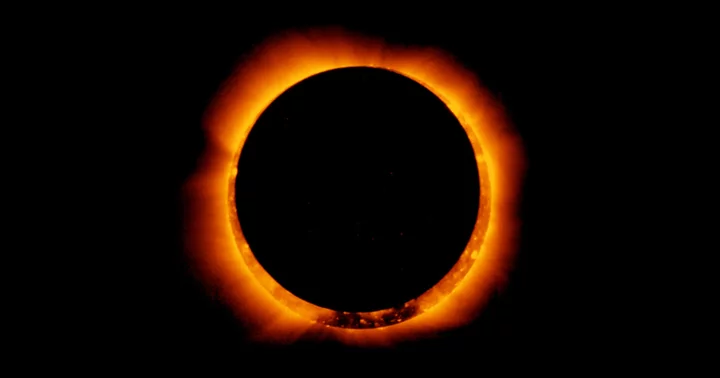PORTLAND, OREGON: An awe-inspiring celestial spectacle is set to grace the skies over parts of the US this year, as the 2023 annular solar eclipse takes center stage.
Mark your calendars for October 14, as the moon passes between the sun and Earth, creating a captivating "ring of fire" effect that is sure to leave skywatchers and astronomy enthusiasts in awe.
This cosmic event promises a breathtaking show that will begin at 12.13 pm ET in Oregon, setting the stage for a three-hour-long celestial phenomenon that will conclude in the heart of Texas.
Where is the solar eclipse path in 2023?
The journey of this eclipse will traverse a 125-mile-long path from Oregon all the way to Brazil, connecting viewers across North and South America in a shared experience of wonder.
While the majority of the US will be unable to witness this phenomenon firsthand, eight states will find themselves fortunate to be in the path of the annular eclipse.
These states include Oregon, California, Nevada, Arizona, Utah, New Mexico, and Texas.
Beyond the borders of the US, the annular eclipse extends its embrace over Mexico, Central America and South America, uniting a vast expanse of the world under a celestial event.
The upcoming annular eclipse holds a unique significance, as it marks the first time in over a decade that this type of eclipse has graced the skies of North America.
The last time this captivating phenomenon was visible over parts of the United States was 11 years ago, illuminating the same eight states that will be fortunate enough to experience it again in 2023.
In an annular eclipse, the moon's position in relation to Earth and the sun results in a stunning visual effect.
Unlike other types of eclipses that temporarily block out the sun's light entirely, the moon's distance from Earth during an annular eclipse creates a unique opportunity.
Positioned perfectly, the moon allows a ring of light to burst through its edges, creating a spectacle that is both enchanting and mesmerizing.
As this celestial performance unfolds, light levels are predicted to wane as the moon covers up to 90% of the sun's radiant face.
Skygazers equipped with eclipse glasses will be treated to a remarkable sight—a brilliant ring of sunlight that encircles the dark silhouette of the moon.
Where is the best place to see the 2023 eclipse?
Michael Zeiler, a seasoned eclipse-chaser and cartographer at GreatAmericanEclipse.com, recommended that individuals seeking an optimal viewing experience consider visiting the US National Parks in the "Four Corners" area.
She recommends the place where Colorado, New Mexico, Utah and Arizona converge "because it's a sunny time of year after the monsoon season and before the winter storms."
"An ideal trip would be to rent an RV and visit some of the magnificent places in the area at a time of year when you're not going to encounter huge crowds, except on eclipse day," Zeiler told Space.com
This region is particularly attractive due to its sunny weather following the monsoon season and preceding the onset of winter storms.
While the entire path encompasses eight states, only specific portions will witness the full splendor of the annular eclipse.
The best viewing spots in southern Oregon are anticipated to be along the coast, while the northeastern region of California will also be treated to the eclipse.
The path then proceeds through southern Utah, southwest Colorado, northeastern Arizona, northwest to southeast New Mexico, and corresponding parts of Texas.
Albuquerque, New Mexico, is poised to be a prime location for eclipse enthusiasts, according to Jayne Aubele from Albuquerque's New Mexico Museum of Natural History and Science.
"Albuquerque is going to be 'ground zero' for the annular and it's the perfect place to see it," Aubele told Space.com.
She added, "The sun will be fairly high in the sky and it happens on the last Saturday of the Albuquerque International Balloon Fiesta."
With the sun positioned high in the sky and the eclipse coinciding with the Albuquerque International Balloon Fiesta, this city is set to be a focal point for witnessing the event.
However, it's important to remember that observing the sun directly, even during an eclipse, can pose a serious risk to one's eyesight.
Enjoying the eclipse safely
Dr Emily Drabek-Maunder, an astronomer at the Royal Observatory Greenwich, cautions against looking at the sun without proper protection.
She advises against using standard sunglasses, binoculars, telescopes, or camera lenses to view the sun, as they lack the necessary filters to safeguard your eyes.
For those eager to witness the spectacle without jeopardizing their vision, there are safe alternatives.
Crafting a pinhole projector by puncturing a small hole in a piece of card and allowing the sun's rays to shine through onto a piece of paper is a simple and effective way to experience the eclipse.
"You will be able to see the shape of the Sun projected onto the piece of paper and watch its shape change as the Moon passes in front of the Sun," Drabek-Maunder said, per the Daily Mail.
Additionally, solar eclipse viewing glasses, which can be purchased online, and special solar filters offer reliable options for safely viewing the event.
As technology offers new avenues for experiencing celestial events, interactive tools such as Xavier Jubier's eclipse website, Eclipse 2024 and GreatAmericanEclipse.com provide valuable information for planning your eclipse-watching adventure.
These platforms offer interactive maps, simulations, and climate predictions to ensure a successful and safe experience.









